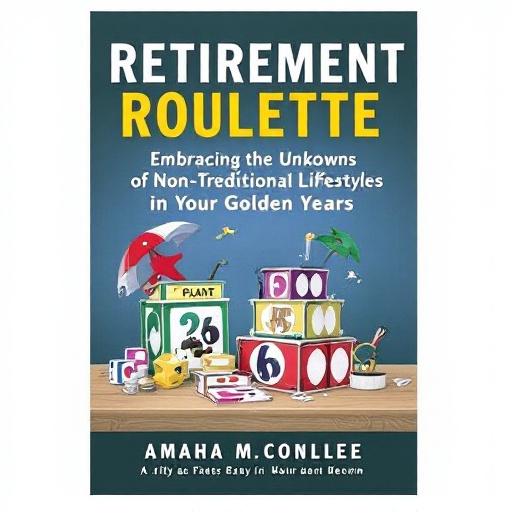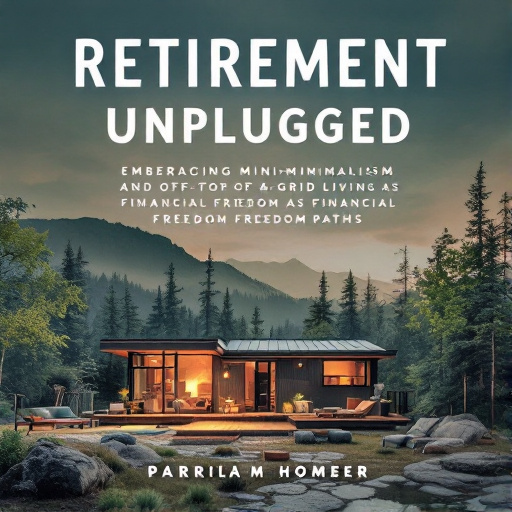Featured Articles
- "Beyond Savings: How Gardening and Hobbies Can Transform Your Retirement Plans"
- Reimagining Retirement: How Virtual Reality Could Transform Senior Living and Financial Independence
- "Rethinking Retirement: How Eco-Friendly Living Is Shaping Future Financial Planning"
- Retire in Style: Exploring the Rise of Sustainable Living Communities for Seniors
- "Retirement Reimagined: How Eco-Conscious Living is Shaping Future Financial Landscapes"
"Retirement Unplugged: Embracing Minimalism and Off-the-Grid Living as Financial Freedom Paths"
"Retirement Unplugged: Embracing Minimalism and Off-the-Grid Living as Financial Freedom Paths"
Retirement today is evolving into a journey less traveled, where minimalism and off-the-grid living are becoming unconventional paths to financial freedom. This article explores how embracing simplicity and sustainable living can pave the way for a fulfilling retirement experience, free from financial burdens and societal expectations.
The New Retirement Paradigm
As the baby boomer generation reaches retirement age, it's becoming increasingly clear that traditional notions of retirement—complete with 401(k)s, second homes, and luxury travel—are slowly fading away. The allure of minimalism and off-the-grid living is drawing a new wave of retirees who are seeking a more meaningful existence, rather than one defined by material wealth.
What Is Minimalism?
Minimalism isn't just about decluttering your home or living with fewer possessions; it's a lifestyle choice that promotes prioritizing experiences over possessions. A 2018 study published in the *Journal of Economic Psychology* suggests that people who embrace minimalism report higher levels of happiness and lower levels of stress (Kasser, 2018). In retirement, this mindset can allow individuals to focus on what truly matters, fostering greater personal fulfillment.
Case Study: The Thompsons' Transformation
Meet the Thompsons, a couple in their late 60s who, after climbing the corporate ladder for 40 years, found themselves yearning for something different. They sold their suburban home, swapped their two cars for a single-used vehicle, and relocated to a tiny home in the woods. “We realized we were accumulating things rather than experiences,” Jane Thompson reflects. “Now, we spend our days hiking and camping instead of working ourselves to the bone.”
Financial Freedom Through Simple Living
Living minimally can significantly cut living expenses, allowing retirees to stretch their savings further. According to the Bureau of Labor Statistics, the average American household spends around $60,000 annually. By adopting a minimalist lifestyle, retirees can reduce expenses to nearly half of that amount, especially when avoiding the burdens of property taxes and maintenance costs associated with larger homes.
What Does Off-the-Grid Living Look Like?
Off-the-grid living may conjure images of log cabins and candlelight, but it’s so much broader than that. It's about becoming self-sufficient, relying on renewable energy sources like solar or wind power, and escaping the constraints of urban life. Given that electricity prices can eat into retirement savings, generating your own power can represent a major step toward financial freedom.
The Costs and Benefits of Going Off-Grid
While the initial investment for solar panels or wind turbines may seem daunting, they often pay for themselves in just a few years. According to EnergySage, the average cost of solar panel installation is around $16,000. However, homeowners can save between $1,500 to $2,000 per year in utility costs, meaning the long-term financial benefits far outweigh the up-front costs.
Real-Life Experiences: Smarter Retirement with Smaller Footprints
Consider the case of Tim and Lisa, a couple in their early 50s who decided that suburban life wasn’t for them. They moved into a mobile tiny home and embraced an off-the-grid lifestyle equipped with solar energy and a rainwater collection system. “Living simply has freed up our time and resources,” Lisa explained. “It’s not just about saving money; it’s about living with purpose.”
The Ecological Impact of Sustainable Living
Switching to a minimalist and off-the-grid lifestyle doesn't just liberate your wallet; it's a powerful way to contribute positively to the planet. Living minimally can reduce your carbon footprint significantly. According to the Global Footprint Network, the average person’s ecological footprint in the U.S. is about 8.2 global hectares, a number that can be drastically reduced through sustainable living choices.
By reducing consumption and relying on renewable resources, we can all play a part in combatting climate change. Imagine a world where fewer resources are consumed for power and heat; this not only saves money but also cultivates a greater respect for our planet.
Finding Community in Simple Living
Many who choose these pathways often find a sense of community amongst like-minded individuals. From Facebook groups dedicated to tiny home living to off-the-grid forums, the camaraderie can be uplifting and motivating. Engaging with others on similar journeys brings inspiration and accountability that enhances the minimalist lifestyle.
Is Minimalism Right for You?
Adopting a minimalist lifestyle is not one-size-fits-all. It can be a daunting concept for those deeply embedded in consumer culture. However, starting small can lead to significant changes and solutions for financial freedom. For example, creating a decluttering plan that targets one room or area of your life can be a manageable way to ease into the minimalism journey.
Objections to Minimalism and Retiring Off-Grid
Despite its many benefits, choosing to retire in a minimalist and off-the-grid manner is not without challenges. Critics argue that this lifestyle can lead to isolation or a feeling of missing out on social engagements, which can be heightened for retirees who may already confront solitude. Additionally, living off-grid requires a particular skill set—gardening, maintenance, and resource management—that not everyone possesses.
Combating Loneliness in Retirement
Nonetheless, combatting loneliness is very manageable. Many retirees who live off-grid find opportunities to connect through volunteer work, community projects, or even local workshops that enhance their skills. According to a study from AARP, about 30% of retirees report feelings of loneliness or social isolation, but engaging in hobbies or community work can help remedy that.
Example: Garden of Friendship
A remarkable case is that of “The Garden of Friendship,” an initiative started by off-grid dwellers in New England. This community garden allows retirees to grow their own food, socialize, and share knowledge about sustainable living. “I never thought I’d meet so many wonderful people here,” says Margaret, a retired teacher, “Gardening has been not just therapeutic, but a way to build friendships.”
The Financial Calculation of Minimalist Living
Finally, let’s talk numbers. A report by the National Endowment for Financial Education (NEFE) cites that 71% of Americans are stressed about their finances, and living simply can alleviate some of that pressure. By reducing monthly expenses significantly, retirees could possibly retire up to 10 years earlier than they could in a traditional setting, while still enjoying a fulfilling lifestyle.
Practical Steps to Transition
If you're intrigued by the idea of minimalism and off-the-grid living, what are your first steps? Here’s a checklist to help you get started:
- Assess your current spending habits and identify unnecessary expenses.
- Take a 'minimalism challenge' by decluttering one aspect of your life each month.
- Engage in online communities to learn about sustainable living and share your experiences.
- Investigate the potential for installing renewable energy sources at your home.
- Consider moving to a more rural area with a community that shares similar values.
Conclusion: A Path Less Traveled
Ultimately, retirement doesn't have to fit a mold designed by societal norms. Adopting minimalism and living off-grid can serve as radical yet freeing choices that lead to financial independence, ecological responsibility, and community connection. Regardless of your age—whether you're in your retirement planning years or actively living in retirement—consider this lifestyle as a genuine option worth exploring. As Thoreau emphasized, the essence of life lies in driving toward simplicity and authenticity. We only have one run at life, so why not spend it truly living?




